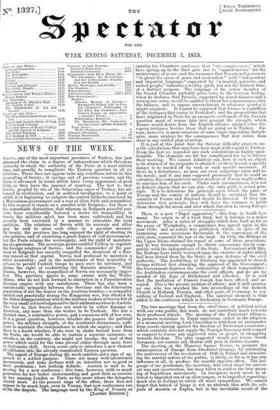There is a new "Papal aggression,"—this time in South Ger-
many. Its origin is of a local kind, but it belongs to a wider movement. After a series of struggles which date back as far as the peace of Westphalia a compromise was agreed upon in the year 1830; and an article was published, which, in spite. of its ,1 containing some provisions favourable to the supremacy of the civil state, remained the law of the land. In 1851, the Bishops of the -Upper Rhine claimed the repeal of some of these provisions, and he was fortunate enough to obtain concessions barely com- patible with the independence of the State. Not content with this, the Bishops have lately ventured upon the exercise of rights which had been denied them by the State, in open defiance of the civil authority. The Archbishop of Freiburg has appointed to church livings without first obtaining the approval of the Government ; the Government deprives the ecclesiastics of their temporalities : the Archbishop excommunicates the civil officers, and we are re- minded of the days of Hildebrand and aBeeket. It is said that the mediation of Francis Joseph has been offered and ac- cepted. This is the present position of affairs ; and it will surprise no one who has watched the late proceedings of the Romish Church in Holland, Prussia, and other parts of Germany, to say nothing of Ireland and England. The spiritual element is thus added to the confusion which is thickening in Germanic Europe.




































